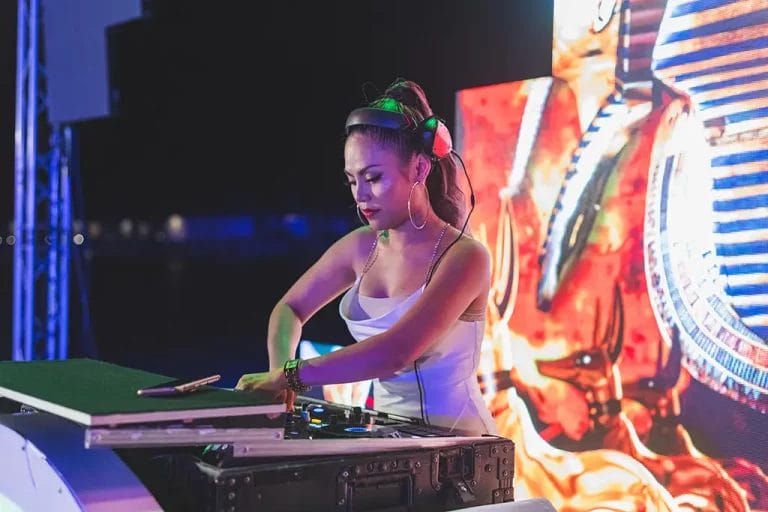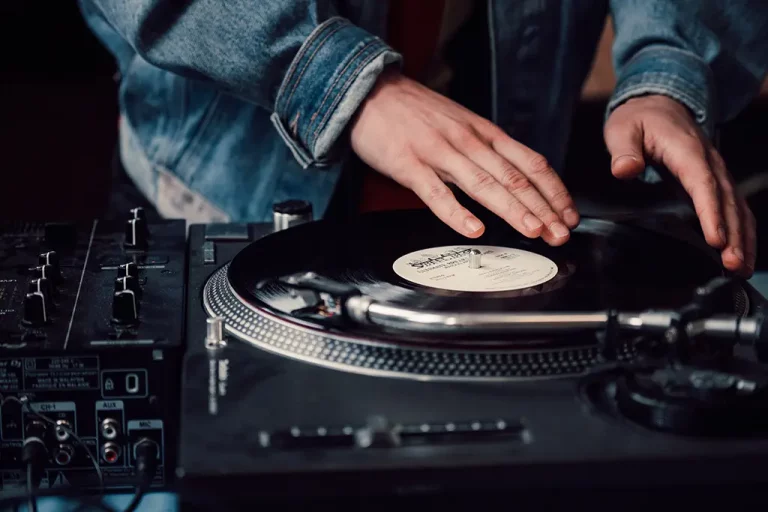
JoAnne Hammer | Program Manager
JoAnne Hammer is the Program Manager for Insurance Canopy. She has held the prestigious Certified Insurance Counselor (CIC) designation since July 2004.
JoAnne understands that starting and operating a business takes a tremendous amount of time, dedication, and financial resources. She believes that insurance is the single best way to protect your investment, business, and personal assets.
JoAnne Hammer is the Program Manager for Insurance Canopy. She has held the prestigious Certified Insurance Counselor (CIC) designation since July 2004.
JoAnne understands that starting and operating a business takes a tremendous amount of time, dedication, and financial resources. She believes that insurance is the single best way to protect your investment, business, and personal assets.
- Last Updated:
- 10/17/2024
- Khaleel Hayes
You’ve set up playlists for skate nights at your local community center and mixed tracks for basement parties since you were 12 years old. Now you feel ready to go professional. But how do you start a DJ business?
Don’t worry! See how to get your DJ business off the ground, from researching your market and understanding your niche to building your website and social media presence.
7 Ways to Kickstart Your DJ Business
You don’t want to only focus on making great music at events — you want to have career longevity and an abundant amount of financial success. You want bookings weeks and months in advance and to feel needed.
But you can’t build your reputation and financial standing in one night. Here are some superb ways to kickstart your business you should practice consistently.
1. Research Your Market
Per Zippia, the average DJ salary in Nevada is $76,638 and the number of employed DJs in the United States is 11,230. So how do you make your DJ skills stand out from more than 11,000 others? Here are a few ways to get ahead of the crowd.
Gravitate Toward Your Niche
Find and build out your niche. You can start a wedding DJ business if you love mixing at weddings, for example. Want to curate songs and be the voice everyone hears on their way to work or on the long drive home? Become a radio DJ who people can’t get enough of and want to keep listening to you.
There are several DJ types to choose from, such as:
- Club (occasional or resident)
- Karaoke Jockeys (KJs)
- Genre-specific (i.e., hip-hop, dubstep, EDM, reggae, and more)
- Mobile
- Radio
- Silent
Finding your niche is the first step in discovering your brand and identifying ways to stand out from competitors.

Pinpoint Competitors’ Prices and Marketing Tactics
Knowing your market is important. It can impact how much you can make as a DJ, help you find the best ways to land DJ gigs, and help you identify gaps in the market you could fill.
Most DJs start out between $200 and $400 an hour depending on the size of the party, equipment used, travel, the type of party you’re attending, and so on. But that rate will vary depending on your local market.
Identify how your competitors price their gigs (hourly, by event, by day, etc.), what services they offer, and how much they charge:
- How much do they charge per hour?
- Do they offer full or multi-day event pricing?
- Does pricing increase depending on the type or size of the event?
- What add-on services or options do they offer?
- What is the service area where they will perform?
- Do they charge more for travel?
Next, notice how your competitors market themselves online and in person with:
- Playlists or demos on sites like Spotify or YouTube
- A DJ business website
- Social profiles and posts, TikTok videos, Instagram Reels, and so on
- Business listings on Google, Yelp, and other directories
- Branding – logo, DJ business name, and so on
- Live stream sessions on Twitch or Discord
- Online ads
- Print flyers or posters on bulletin boards
- Business cards
- Merch
Later, we’ll show you how these and other marketing ideas can help you build awareness and engage your own fans.
2. Define Your Service Offerings
Services are the bread and butter of your DJ business and should be crafted like a restaurant’s menu. Types of speakers, playlists, lighting, and effects are just the beginning. You can also look for add-on services to make extra revenue.
Outline Your Core Offerings
Think about core offerings in terms of packages, such as basic, premium, gold, platinum, and so on. The more choices you set, the more reception you could receive from different clients.
Some core offerings include:
- Hourly rates/special events (i.e., weddings, private parties, corporate events, and so on)
- Type/number of speakers
- Lighting types
- Tracklists (pre-set or customizable)
Your basic package can include simple mixes, basic speakers, and a little lighting while your gold or platinum bundles could have additional effects, tailorable song selections, and add-ons like photo booths, special effect lighting, hosting as the master of ceremonies (MC), and more — for a time guests won’t forget.
Add Value With Add-ons (and Create Additional Revenue Streams)

Offering different services shows customers you’re more than a one-trick pony, and edges you out among competitors. It also helps you increase what you can earn with each gig to create extra revenue.
Some add-on services you can provide include:
- Photo booths: Make your events a time to remember with a photo booth for any one to snapshot themselves having a great time.
- Lighting effects: Play with neon, mirror or disco balls, smart lights, strobe, and other light fixtures to brighten up your performances and make them pop.
- Fog machines: Give your set some dramatic vibes with fog machines.
- Karaoke: Do you enjoy getting people to sing along to your songs? Set up a karaoke station for others to pick and sing their favorite songs.
- Master of Ceremonies (MC): Be the DJ host with the most by MCing ceremonies and events like pageants, award dinners, corporate luncheons, conferences, and so on.
Price Your Services
Make tiered pricing packages for services (i.e., music and photo booth, music, photo booth, and lights, music and lights, music, MCing, and lights, etc.)
Some example prices you could use include:
- Lighting: $200-$500+ or $25+ per light.
- Events/hourly rates: $200 for two hours or $1,000+ for all-day/all-night events (such as weddings, bachelor or bachelorette parties, corporate gatherings, and more).
- Speakers: You could charge an extra $100-$500 for additional speakers used (surround sound, wireless, tweeters, and so on).
Add-on service pricing examples also include:
- Photo booths: $200-$1,000 per event and $100-$500 for an hourly rate
- Fog Machines: $200-$500 per event
3. Gear Up with DJ Equipment
Find the right DJ gear to suit your needs based on the services you plan to offer. The cost of DJ equipment can range from $4,000-$9,000, or more.
Some ideal beginner DJ equipment includes:
- Speakers
- Mixers
- Turntables
- Laptops
- Subwoofers
- DJ software — and more
Starting a DJ business can be expensive, but there are ways you can save! Find deals on used or refurbished gear through eBay, Amazon, and other online retailers.
4. Brand Your Business

You know what’s cooler than starting your own DJ business? Branding it to stand out in the industry.
Ok, you got us. Branding and marketing your DJ business doesn’t give you the same thrill as using your gear to spin epic tracks for crowds. But if you spend as much time building a strong brand as you do crafting your tracklists, you can stand out from similar DJs — and get more gigs.
- Choose a name for your business: Picking a DJ name is like naming your car — you want something to strike a chord with you and others and be easy to remember.
- Create a logo: Take some pencil and paper and doodle away until you find a unique design that matches your DJing style or energy. Or get professional help at a low cost – Fiverr offers access to graphic designers who will create your logo for as little as $25.
- Nail down your DJ business brand colors: Opting to use specific colors throughout your marketing can make your brand more memorable.
- Find your brand voice: The “voice” of your marketing materials should be a reflection of who you are as a DJ, your niche, and so on.
It’s not a requirement, but consider copyrighting or trademarking your logo and business name so no one uses it without your permission and other DJs can’t steal your intellectual property. You can file online and pay the appropriate fees on the U.S. Copyright or United States Office of Patent and Trademark Office (USPTO) websites.
5. Make It Official With Paperwork and a Plan
Part of how to start a DJ business is to make it official. This means that your business needs to be registered, licensed, and insured – this will make it easier to file taxes, protect your career, and even book gigs.
Set Your Business for (Legit) Success
- Compare your options and decide on a business structure (sole proprietorship, corporation, limited liability corporation, etc.)
- Get a license to do business in your state.
- Apply for an Employer Identification Number (EIN) for tax purposes and to stay aligned with the IRS.
- Protect your business and career with DJ liability insurance.
- Follow guidelines for the Corporate Transparency Act for small businesses.
- Get a DJ license for playing copyrighted music in public areas.
Did you know? Venues are responsible for having public performance licenses. But if you’re hosting a separate public event in a park or at the beach, it’s best to get a public performance license.
This license ensures artists you play still receive their royalties. You can find artists’ songs through these organizations:
- American Society of Composers, Authors, and Publishers (ASCAP)
- Broadcast Music, Inc. (BMI)
- Society of European Stage Authors and Composers (SESAC)
Once you find songs through these websites, you can apply for a public performance license through them.
Create a Business Plan

6. Rev Up Your Marketing Engines
Think of your DJ business plan as a roadmap. It should tell the story of how your business started, where it is now, and include goals you want to achieve over time.
Here are some must-haves for your business plan:
- Executive summary: Why your business was started, and your business’ mission, vision, and core values statements
- Company overview: Summary of why you wanted to start a DJ business and a high-level overview of the services you offer
- Market research: Identifies and outlines the economic and competitive landscape of the marketplace (the geographic region where you plan to offer services) as well as opportunities
- Financial plan: An overview of how you’re funding your DJ business’ startup (this can be especially helpful if you want to attract investors or partners)
- Operations and management: A list of the services offered and operational details like who is responsible for setup and takedown of equipment
- Marketing plan: How you plan to promote your DJ business
- Milestones and goals: Measurable goals you want to achieve in the near term (3-6 months) as well as your long-term goals — where your business is now and where you want it to be in the future
Marketing your DJ business boosts the visibility of your business name and logo. You can reap the benefits without even being a marketing expert if you play your cards right with useful marketing tools. Let’s review some in more detail.
Website
You can showcase numerous things on your website — headshots, a DJ bio, samples of playlists you use, video demos, clients you’ve worked with, and more. Your website should highlight everything about your DJ services, be easy to find and navigate, and reflect the brand of your new DJ business.
Your website can even help you book gigs. If you use Weebly, for example, you’ll have easy-to-add widgets for menus or payment processing tools through its parent company, Square.
For a more custom look, try Wix. You can have a site built in minutes using the Wix artificial intelligence (AI) website builder and it has embeddable tools for booking gigs, signing documents (like contracts) electronically, taking payments online, and more.
Social Media Profiles
Take to social media channels like TikTok, X, Facebook, Discord, LinkedIn, and more for global promotion and outreach. Post videos of your latest gigs and performances. Do live streaming on social media channels for fan interactions, Q&A (question and answer) sessions, live performances, and more.
Listings (Google, Yelp, and DJ Directories)
Your new DJ business can appear on listings like Google, Yelp, and DJ directories for additional online visibility.
- Create a Google Business Profile with vital information like your business address, phone number, website, headshot, and more. It’s like having a flier made specifically for Google users as Google Profiles often appear alongside top websites in search engine results.
- List your business on a Yelp page for local visibility. Post photos, track traffic, respond to customer reviews, and more.
- Get a spot in DJ directories like The Knot’s DJ marketplace, Wedding Wire, Gig Salad, and more for visitors seeking specialized services.
Spin Up Marketing Materials
There are numerous print and digital marketing materials you can create and distribute to clients to boost visibility and (hopefully) more attendees at your DJ events. Items to include in your arsenal of marketing materials include:
- Business cards with your contact info, logo, and link to your website or online demo video
- Flyers and posters to showcase upcoming performances
- A media kit (with your bio, headshot and link to online marketing videos, demos etc.)
- Merchandise (aka “merch”) to wear, give away to your top fans, sell, and so on
Invest in Advertising
Create online ads for social media channels like Facebook, Instagram, and others to generate more traffic for your website or clicks to event bookings. These platforms offer highly targeted options, making it easy for you to build brand awareness with fans and event organizers (or venue owners) alike.
Create Demo Videos
What better way to show off your DJ skills to potential venues and clients than a demo video? Demos show prospective clients, venues, and event organizers what you’re made of and why they should hire you.
Record yourself mixing songs, using your equipment, and hyping up the crowd. If you’re a beginner, it can even be a practice video shot in front of friends or loved ones with your gear. If you have a few gigs like birthday parties or corporate events, you could record yourself hyping up the event.
Find Performance Opportunities

To start a DJ business, you’ll need to find the right venues and events to showcase your unique talents and tunes. These should be venues that represent a close match to your niche, branding, and even how much you want to make as a DJ.
There are a few approaches to getting gigs at venues, including:
- Contacting venues via a phone call or email asking about their DJ policies
- Visiting venues, watching their DJs perform, and introducing yourself to the booking manager
- Reaching out for corporate venue bookings through your local Rotary or Chamber of Commerce
- Persuading venue owners who don’t have DJs why they should hire you
- Sending venues and event organizers marketing materials with links to videos of you DJing an event or to online demos, sample playlists, etc.
- Networking with local DJs and asking for referrals
Getting gigs is likely top of mind as you start a DJ business — check out these ideas for how to get more gigs.
7. Build Your Network
The DJ industry is all about meeting new people, including other DJs, to “talk shop” with and create lasting friendships within the industry. Building a network can also help you get more gigs through referrals.
Let’s say a DJ can’t make an event due to a last-minute emergency. Instead of canceling the show, they refer you to the venue owners and you could host the event.
Or, one DJ could run into a potential client looking for wedding DJs. Since you do weddings, they could refer the customer to you. Boom! You have another gig for your schedule.
Networking gives you the chance to mingle with other DJs and rub elbows with other venue owners and event coordinators.
Visit Music Festivals, Concerts, and Club Nights
Building a music network requires going out and meeting new venue owners, event coordinators, musicians, DJs, and others in the industry. Rubbing elbows and shaking hands allows you to see what’s out there in your community.
Join Your Local Chamber of Commerce
Become a member of your local Chamber of Commerce, an organization that provides resources and networking opportunities for all kinds of businesses, big or small. This gives you additional local exposure to potential corporate DJ opportunities and introduces you to influencers – community leaders who might refer your services to their networks.
Most also have member directories that are distributed online and through city tourism bureaus, giving your new DJ business even more exposure.
Industry Meetups
As the saying goes: “Sometimes it’s not what you know but who you know.” The more people you know, the more word-of-mouth opportunities arise. Venues and event leaders can refer you to other events and venues you may not have heard of, which can get you more gigs.
Collab with Other DJs and Musicians
Getting on a song with a more popular musician introduces you to more listeners – who may then want to hear more of your work or see you DJ at another club. Likewise, working with other DJs can introduce you to more events — weddings, corporate events, and birthday parties — and receive pointers on how to rock the crowd.
Is Now a Good Time to Start a DJ Business?

Yes — now is a great time to start a DJ business as there are so many different avenues you can take, such as traditional DJs, event work, karaoke, corporate or silent DJs, and more. Still hesitant? Here are a few salary and region statistics that may change your mind.
DJ Salaries
Per ZipRecruiter, the average DJ salary is $85,596. Here are the top 10 cities and annual salaries for DJs:
Redwood City, CA – $114,400
Berkeley, CA – $105,349
Jewett, TX – $102,456
New York City, NY – $102,224
Dublin, CA – $101,659
Renton, WA – $101,538
Laguna Beach, CA – $101,502
Walnut Creek, CA – $101,128
Santa Monica, CA – $100,813
East Hampton, NY – $100,638
Check out this article for more information about how much money DJs make.
Specialties and Career Options for DJs
While spinning tracks at different events is cool, there are other music-oriented roles DJs can take. Let’s review a few in more detail:
- Artists and repertoire: If you love searching for talent, being an artists and repertoire rep could be right up your alley. Search for talented artists and serve as liaisons between artists and record labels or music publishing companies.
- Music producer: If you’re good at making beats, you could sell them to other artists to use in songs to make profits.
- Music journalist: If you love the music industry and like writing, you could work as a music journalist. Interview different artists, producers, record label owners, and more for in-depth pieces for music magazines, podcasts, and more.
- Record label owner: If you have an entrepreneurial spirit, instead of a DJ business, you could launch a record label. You can hire the best DJs, artists, producers, and more to get songs and albums out at radio stations and music streaming platforms.
Before You Gig: Protect Your Business With Insurance
Having a DJ business is all fun and games until someone gets hurt. They’ll sue you to pay for their medical bills. Or your fog machines and stereos scuff up a venue’s floor and you’re stuck with property damage bills.
Better be safe than sorry. Get DJ insurance so you don’t have to worry about paying for damages or legal fees out of pocket. Year-round coverage only costs $18.50 a month. Only working one or two events? Get 1-3 day DJ event insurance for $59.
Frequently Asked Questions (FAQs) on How to Start a DJ Business
Do DJs Make Good Money?
Yes. DJs can make good money, in some cities the average salary for a DJ is even into the 6-figures, although the average is $85,596 in the U.S.
How Much Can I Make as a DJ?
According to ZipRecruiter, you can make anywhere from $13.94 to $75.96 per hour as a DJ. DJs in the U.S. make an average of $41.15 per hour. How much you can earn depends on factors like how much you work, your regional economy and marketplace demand, the type of DJ services and add-ons you offer, and more.
How Much Does It Cost to Start a DJ Business?
Starting a DJ business can cost anywhere from $4,000 to $23,000. This range includes equipment, DJ insurance, business registration fees, websites and domain names, public performance licenses, and so on.
Should DJs Get an LLC?
Setting your DJ business up as a Limited Liability Company (LLC) can protect your personal assets from claims arising out of your professional liability. But keep in mind that your career and business finances are still at risk – you need DJ liability insurance to ensure that a claim doesn’t threaten your success as a professional DJ.
Does a DJ Need a Business License?
Yes – unless supplied by the venue, DJs need a public performance license when playing songs in a public place like a park or city sidewalk to avoid playing songs in public places illegally.





